BACKGROUND
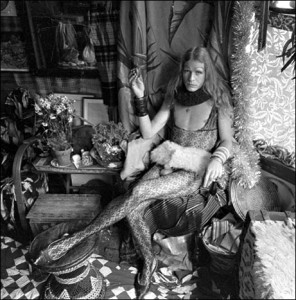
Cockette relaxing ©Bud Lee
Bill Weber and David Weissman both got their first glimpse of The Cockettes in the 1971 underground film, TRICIA’S WEDDING. A hilarious parody of the wedding of President Nixon’s daughter, TRICIA’S WEDDING premiered on the night of the actual White House wedding and became a fixture on the cult film circuit.
For both Weber and Weissman, who met two decades later, TRICIA’S WEDDING offered a concoction that was entirely new, yet strangely familiar at the same time. In the film, The Cockettes combined political parody, LSD, gender-bending sexuality, and the kind of chaotic hippie fun that San Francisco was famous for. To these two counter-culture oriented young men in their late teens who were just beginning to come out of the closet, The Cockettes were a gay revelation – hip, liberated, in-your-face, and completely subversive.
Weissman moved to San Francisco in 1976, and after a couple years of waiting tables and a brief City Hall political career, he began taking film making classes at San Francisco City College.
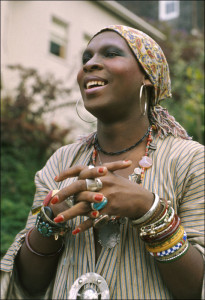
Sylvester, Cockette and future disco star ©Clay Geerdes
TRICIA’S WEDDING remained a source of inspiration as Weissman began making short offbeat comedic films, sometimes with performers who were descendents of the Cockette scene.
Weber received a BFA in film at NYU in 1979. He then enjoyed the playful, lucrative, “get ’em in, get ’em out” world of commercial editing, first in New York and then in San Francisco. Though bearded drag queens on acid didn’t gain much visibility in the commercial world, the Cockette seed that was planted continued to germinate in Weber’s fertile imagination.
Weissman and Weber met in the mid-1990s when the two worked together producing a film trailer for the San Francisco International Lesbian and Gay Film Festival, and they discovered many shared interests and sources of inspiration. In 1998, while both were contemplating new directions in work and life, Weissman suggested to Weber the idea of making a film about The Cockettes. Though neither had made a documentary before or feature film before, THE COCKETTES seemed like an irresistible calling and Weber jumped at that opportunity without a pause.
RESEARCH
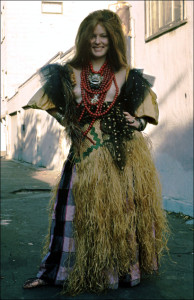
Fayette ©Clay Geerdes
The first step in making this film had to be locating the surviving members of the troupe, and ascertaining their willingness to participate. Many former Cockettes were deceased, either from AIDS or, in earlier years, from drug overdoses. Luckily, a number of the core group were easily found, and quite enthusiastic from the get-go.
Fortunately, an ex-Cockette named Martin Worman had begun work on a PhD dissertation about the Cockettes at NYU which made it easier to locate adequate archival materials and to research Cockette history. Martin compiled extraordinary documentation, including hundreds of hours of recorded interviews, many with Cockettes and friends who had died in the interim such as disco diva Sylvester, and Allen Ginsberg. Unfortunately, Martin died of AIDS in 1993. His surviving partner, Robert Croonquist put all of Martin’s archives at Weber and Weissman’s disposal, enabling them to hit the ground running.
PRODUCTION
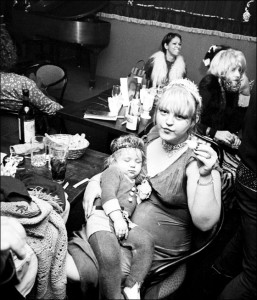
Dusty and Ocean ©Bud Lee
Beginning in April 1998, Weber and Weissman spent the next two years conducting interviews with former Cockettes, friends and family members, fans (including John Waters, who lived in San Francisco at the time) and detractors. An enormous amount of visual documentation was unearthed, including Cockette related 16mm films (TRICIA’S WEDDING, THE PALACE, ELEVATOR GIRLS IN BONDAGE, PICKUP’S TRICKS), some never before seen documentary footage of the Cockettes’ tumultuous venture to Broadway, amazing 8mm and super-8 films, and over 13,000 still photos.
For Bill Weber and David Weissman, making THE COCKETTES has been a labor of love, and an incredible adventure. To be able to tell a story that includes the idealism and wildness of 1960s counterculture, the beginnings of the sexual and gender revolutions of the 1970s, singing, dancing, LSD and drag queens – who could ask for more?
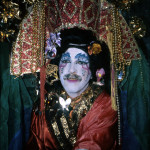
Scrumbly ©Clay Geerdes
The production of THE COCKETTES proved to be the catalyst for new friendships, as well as renewed ones among Cockettes who had not been in touch for many long years. It has also been a story of great generosity on the part of many who possesed film and photo archives, people who were thrilled that the story of those crazy times would finally be told.
THE COCKETTES is a story that perhaps needed the distance of 30 years to be told with perspective and appreciation, and without apology.
